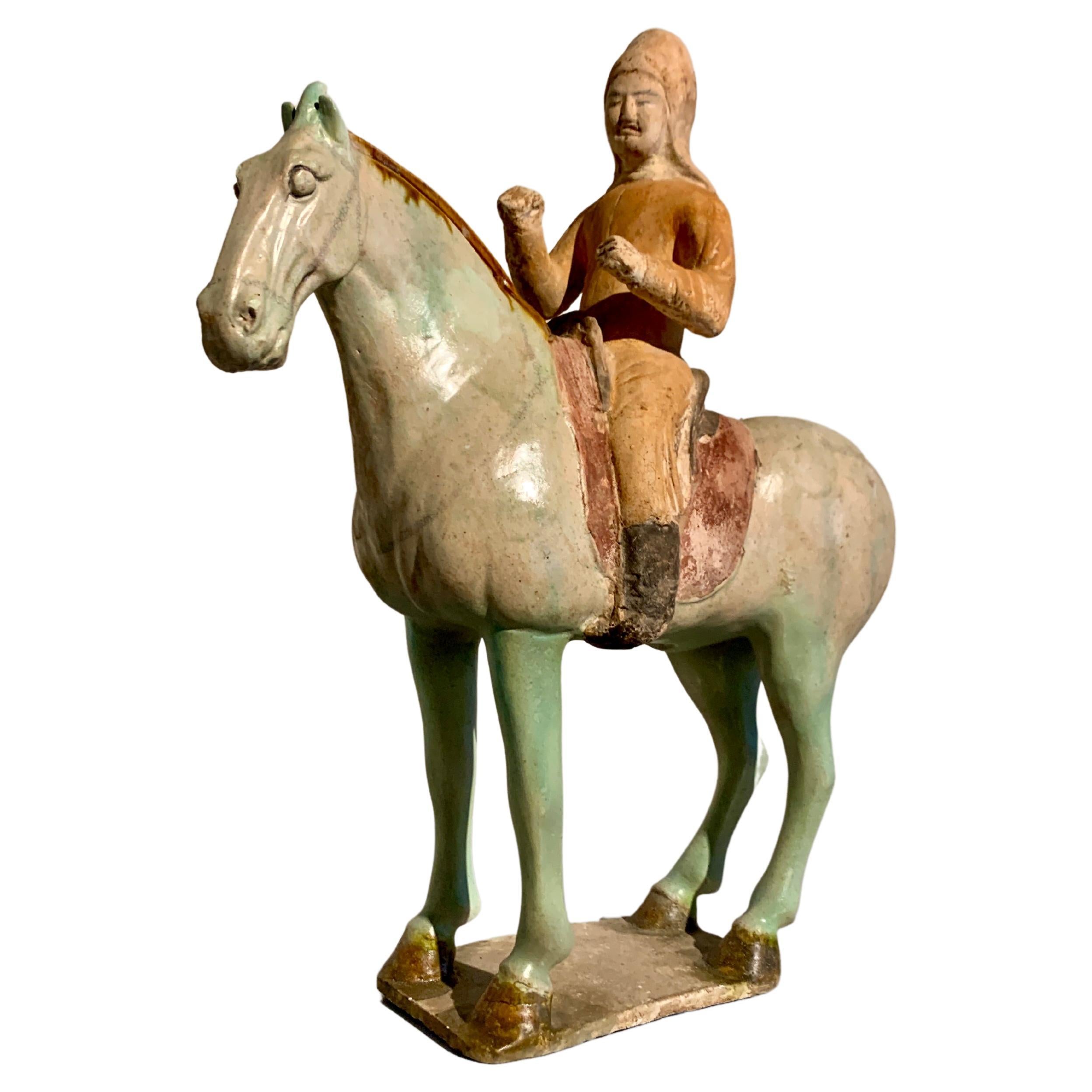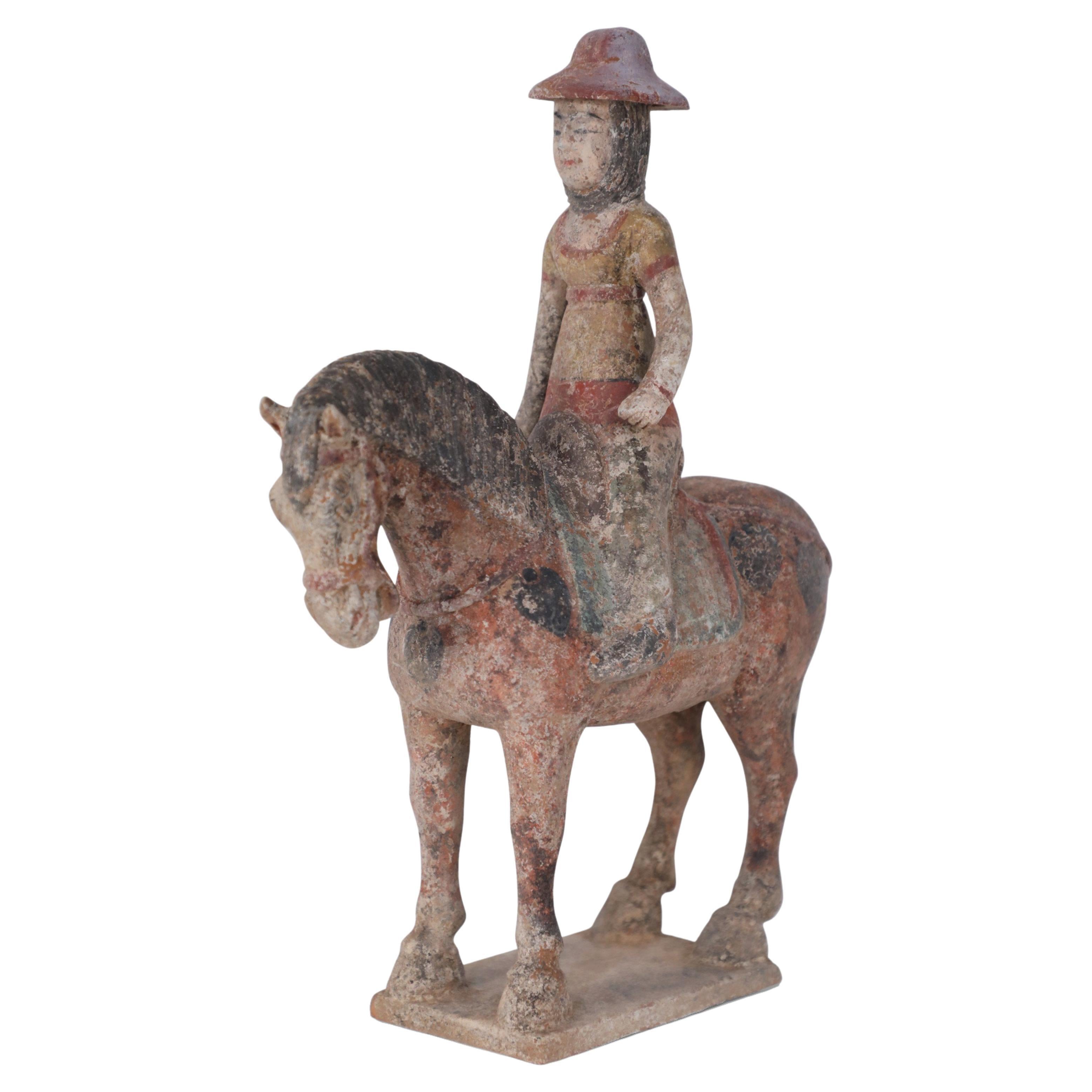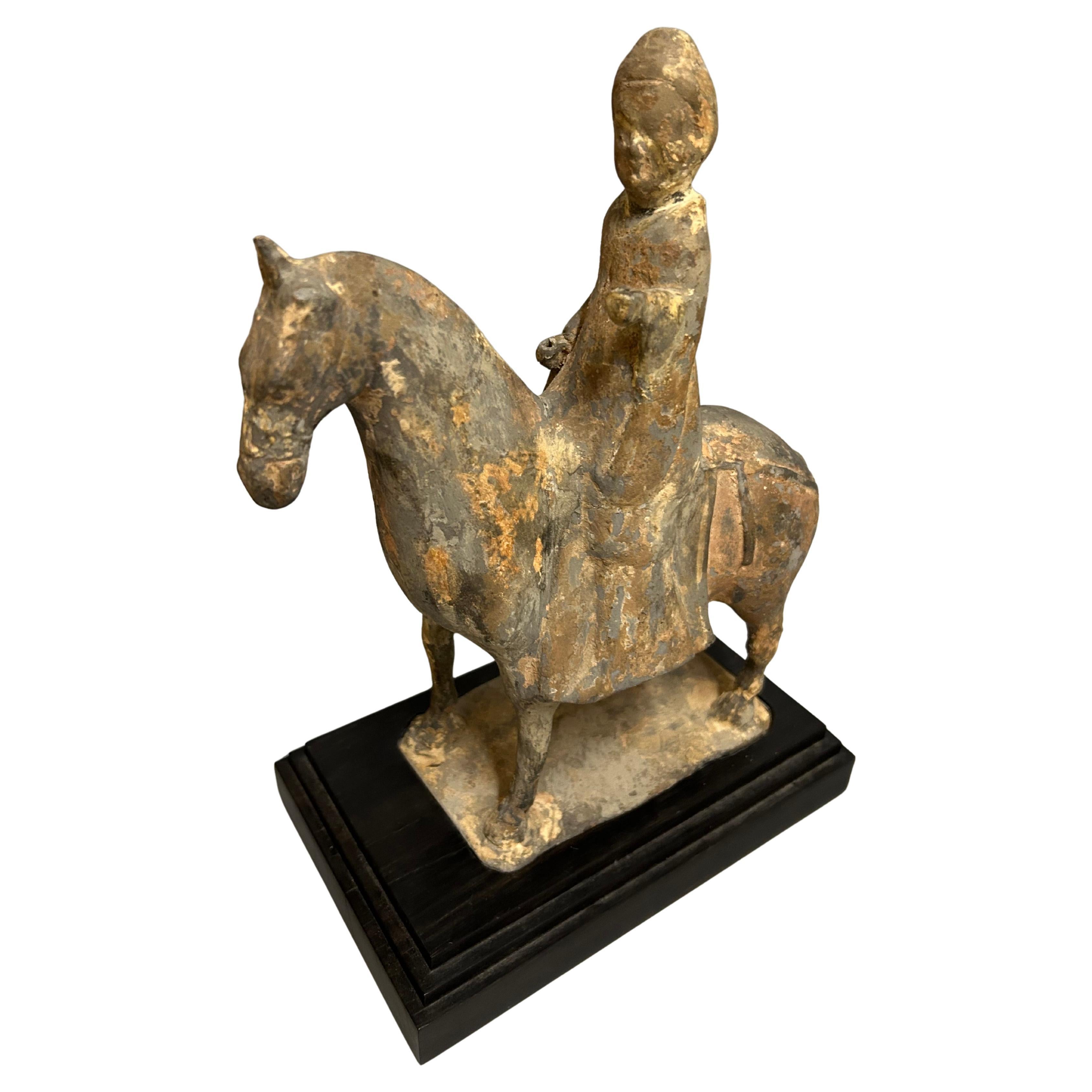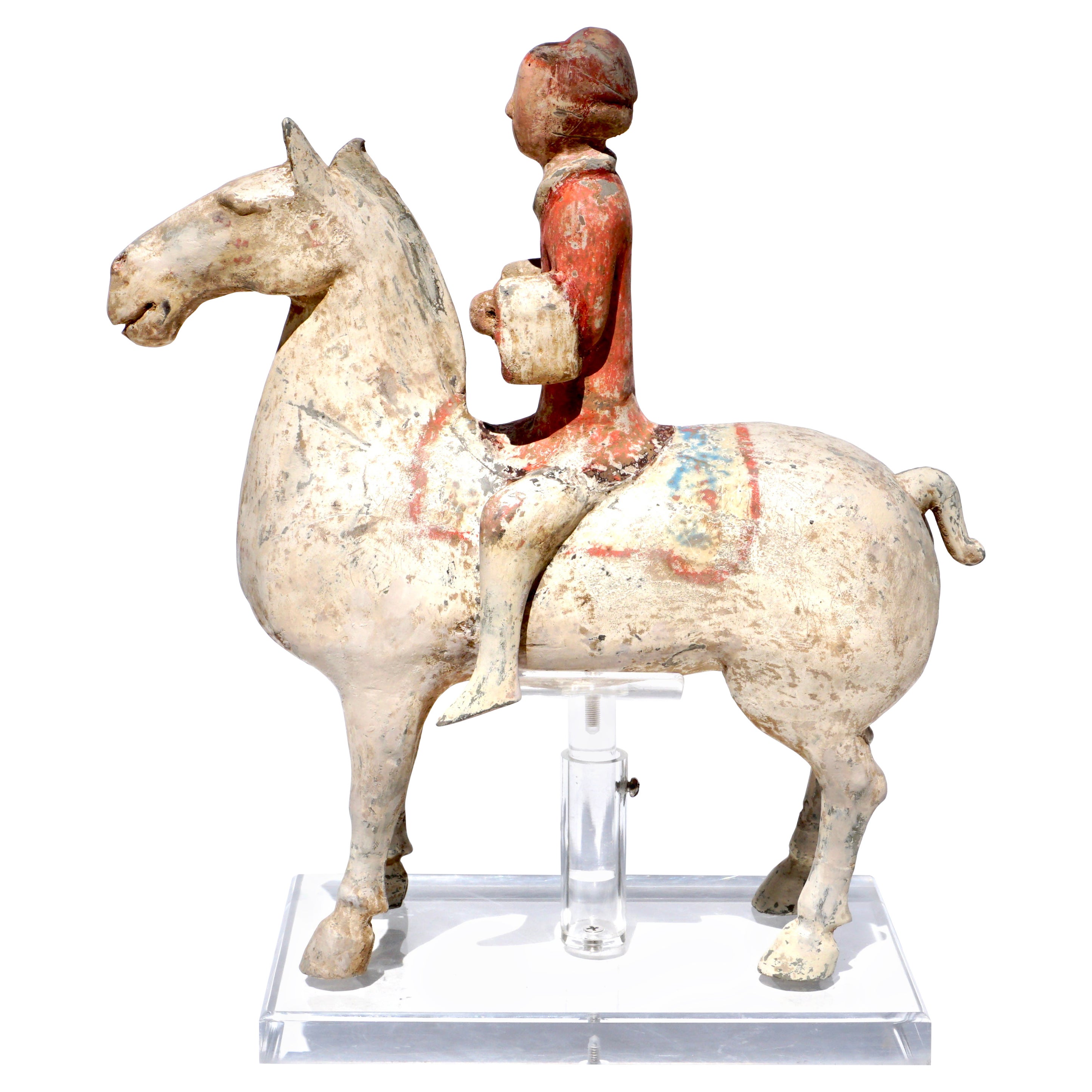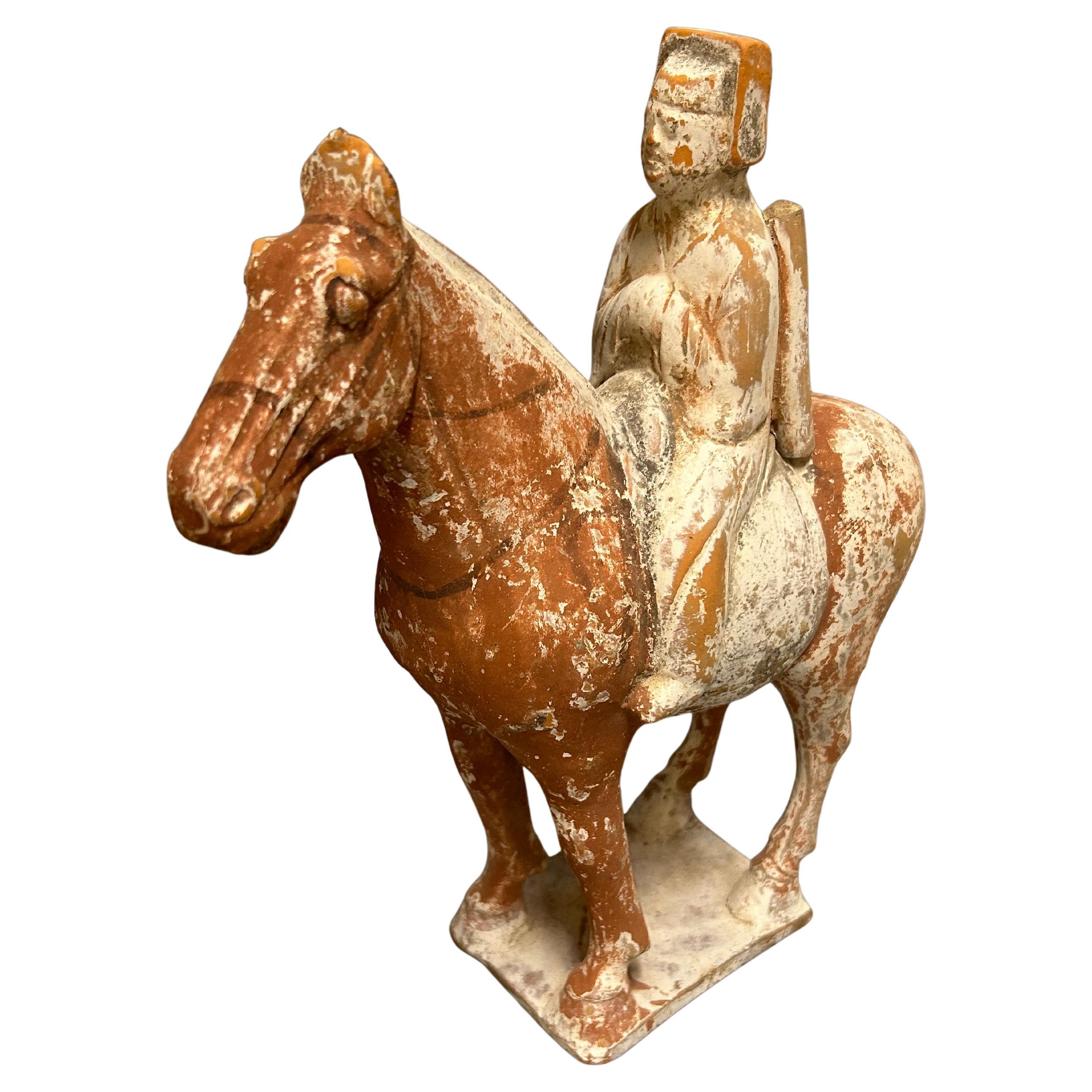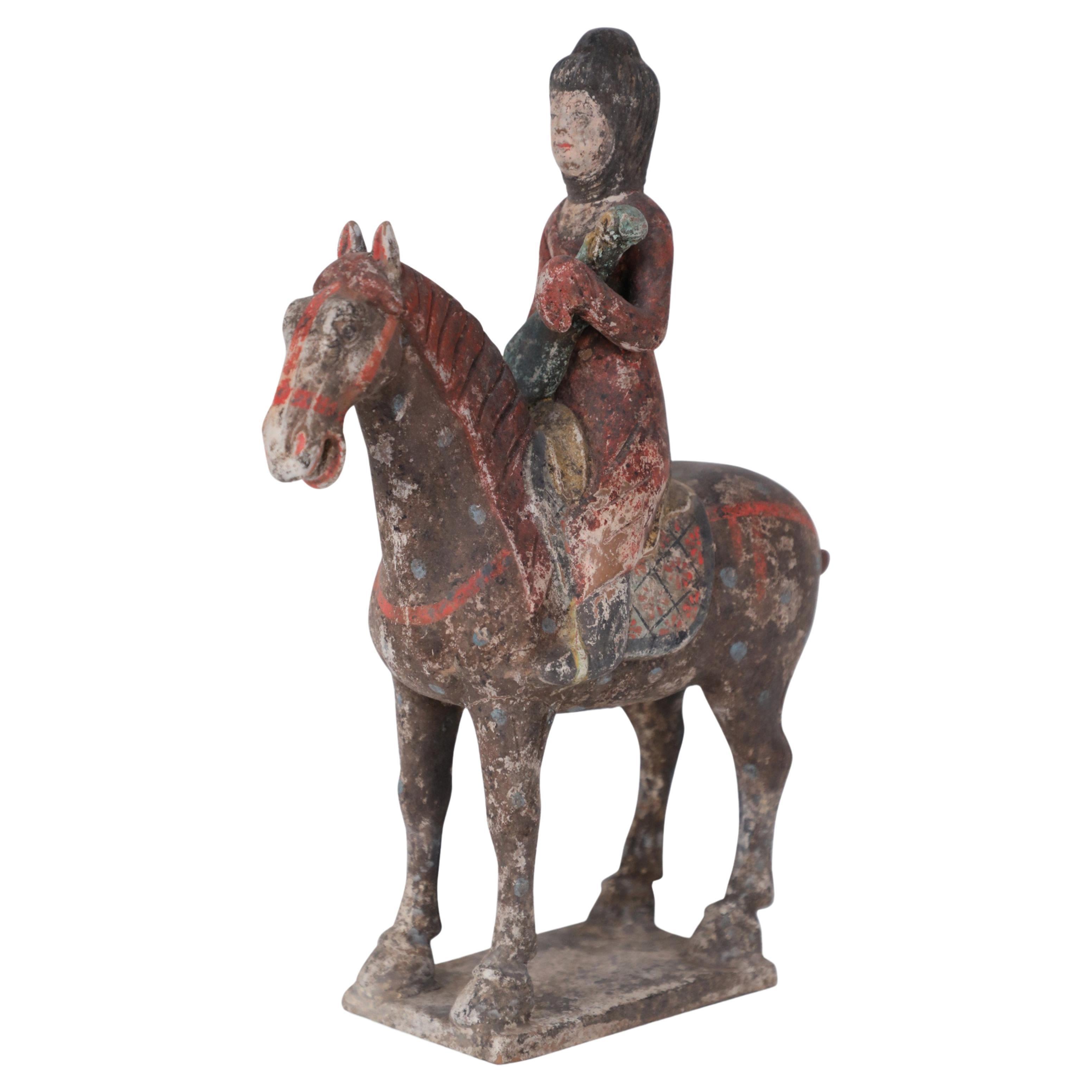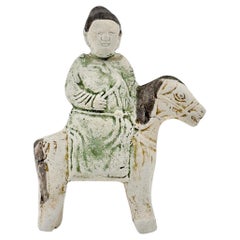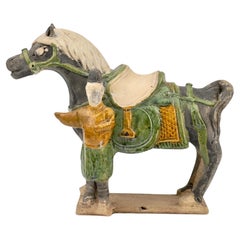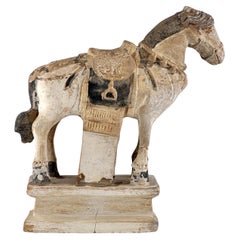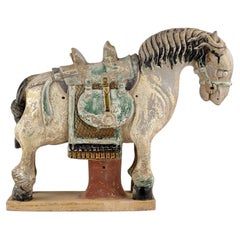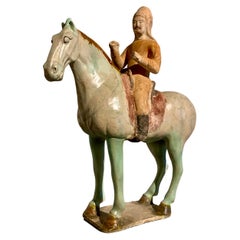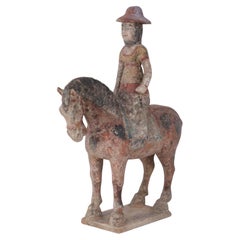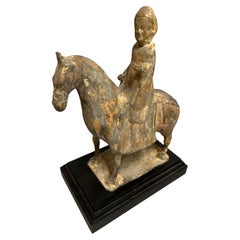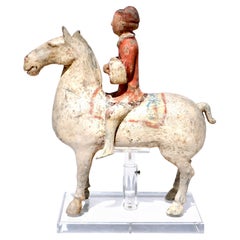Items Similar to A Straw-Glazed Pottery Figure of a man on Horseback, Sui to Tang Dynasty
Want more images or videos?
Request additional images or videos from the seller
1 of 13
A Straw-Glazed Pottery Figure of a man on Horseback, Sui to Tang Dynasty
$975
$1,50035% Off
£740.20
£1,138.7735% Off
€846.63
€1,302.5235% Off
CA$1,362.22
CA$2,095.7235% Off
A$1,515.08
A$2,330.9035% Off
CHF 791.13
CHF 1,217.1235% Off
MX$18,436.94
MX$28,364.5235% Off
NOK 10,103.92
NOK 15,544.4935% Off
SEK 9,475.70
SEK 14,577.9935% Off
DKK 6,318.76
DKK 9,721.1735% Off
Shipping
Retrieving quote...The 1stDibs Promise:
Authenticity Guarantee,
Money-Back Guarantee,
24-Hour Cancellation
About the Item
The rider is seated upright, wearing a smoothly draped robe with finely sculpted folds. The red markings on the garment surface are likely either soil deposits or remnants of pigments used for decorative detailing.
The horse’s head is slightly lowered, with small ears and finely carved details that create a lifelike expression. The straw glaze exhibits a soft yellowish-green hue, subtly enhancing the ceramic's smooth texture. The figure retains significant soil deposits from burial, overall, the structure remains well-preserved. There is a hole on the head, which suggest that a headdress or decorative element was once attached.
Date : Sui-Tang Dynasty
Type : Straw-glazed pottery figure
Dimension : 31cm (Height) x 24cm (Diameter)
Condition : Good
Provenance : Acquired in late 1990s from Hongkong
Reference :
1) V&A - Accession number C.1161913 - Figure of a woman on horseback
(Type : related)
* Sui-Tang Dynasty Straw-glazed Earthenware (581 907 CE)
Straw-glazed earthenware from the Sui and Tang dynasties (581–907 CE) is characterized by a pale yellow, off-white, or greenish glaze fired at a low temperature. This type of glaze, known as straw glaze, contains minimal iron content, resulting in a soft, natural hue with a subtle sheen rather than a glossy surface. It was commonly used for mingqi (明器)—funerary objects placed in tombs—as well as for practical vessels.
During this period, the influence of foreign cultures through the Silk Road is evident in the design of straw-glazed ceramics, particularly in figurines representing warriors, attendants, and animals. These pieces reflect the cosmopolitan nature of the Tang Dynasty, incorporating elements of Central Asian and nomadic attire. As tomb objects, they symbolized the deceased’s status and authority in the afterlife.
While technically simpler than Tang Sancai (唐三彩, three-colored ware), straw-glazed ceramics exhibit elegant curves and refined craftsmanship, making them an important representation of the artistic sophistication of the era.
- Dimensions:Height: 12.21 in (31 cm)Diameter: 9.45 in (24 cm)
- Style:Tang (Of the Period)
- Materials and Techniques:
- Place of Origin:
- Period:
- Date of Manufacture:581–907 CE
- Condition:Minor fading.
- Seller Location:seoul, KR
- Reference Number:1stDibs: LU9577243557002
About the Seller
4.8
Gold Seller
Premium sellers maintaining a 4.3+ rating and 24-hour response times
Established in 1999
1stDibs seller since 2023
38 sales on 1stDibs
Typical response time: <1 hour
- ShippingRetrieving quote...Shipping from: seoul, Korea South
- Return Policy
Authenticity Guarantee
In the unlikely event there’s an issue with an item’s authenticity, contact us within 1 year for a full refund. DetailsMoney-Back Guarantee
If your item is not as described, is damaged in transit, or does not arrive, contact us within 7 days for a full refund. Details24-Hour Cancellation
You have a 24-hour grace period in which to reconsider your purchase, with no questions asked.Vetted Professional Sellers
Our world-class sellers must adhere to strict standards for service and quality, maintaining the integrity of our listings.Price-Match Guarantee
If you find that a seller listed the same item for a lower price elsewhere, we’ll match it.Trusted Global Delivery
Our best-in-class carrier network provides specialized shipping options worldwide, including custom delivery.More From This Seller
View AllHorse and Rider Figurine c1725, Qing Dynasty, Yongzheng Reign
Located in seoul, KR
A rider wearing an green gown. He is seated side saddle on a yellow painted horse with riding crop in hand. It was worn away on the sea floor.
Period : Qing Dynasty, Yongzheng Perio...
Category
Antique 1720s Vietnamese Chinoiserie Antiquities
Materials
Ceramic, Porcelain
$792 Sale Price
20% Off
Ming Dynasty Green-Glazed Horse and Rider (15-16th Century)
Located in seoul, KR
Statues of Chinese horse and rider, featuring glazes in green, amber, are set on rectangular bases.
Period: Ming Dynasty
Medium: Green-glaze...
Category
Antique 15th Century and Earlier Hong Kong Ming Antiquities
Materials
Pottery
Ming Period Large Pottery Horse with Saddle (15-16th Century)
Located in seoul, KR
This Ming Dynasty painted pottery horse is depicted standing on a tiered rectangular pedestal. The horse has a well-proportioned body, with sturdy legs and a slightly arched neck. The eyes and muzzle are subtly outlined and incised.
The mane is sculpted with deep, parallel grooves. The tail is long and slightly curved left, extending downward. The saddle is prominently featured at the center of the horse’s back, detailed with a raised, rounded seat and an attached stirrup hanging down one side. The saddlecloth is textured with a crosshatch pattern, bordered by a row of carved fringe-like elements. The horse's legs display subtle musculature, and the hooves are clearly defined, with black pigment accentuating their edges.
The original painted pigments, including white, black, and ochre, are still visible, though faded in some areas. The black pigment highlights the mane, tail, and parts of the bridle, while the ochre tones accentuate the saddle and decorative elements.
Period: Ming Dynasty
Medium: Green, black, and ochre glazed Pottery
Type: Figure
Provenance : Acquired in late 1990s from Hongkong
Reference : Asian Civilisations Museum - Accession No. C-1384 / 1994-00441 - Ming Dynasty Figure of Horse
(Type : Closely Related)
* Ming Dynasty Glazed Pottery Figures
Ming Dynasty glazed pottery figures are renowned for their bold color palette, intricate detailing, and lifelike forms, distinguishing them from earlier traditions. These figures, which depict officials, warriors, animals, and mythical creatures, are characterized by high-gloss lead-based glazes in green, amber, ochre, and sancai (three-color) combinations. The thickly applied glaze pools in recesses, creating depth and enhancing sculptural details. With dynamic postures, expressive facial features, and meticulously rendered drapery, these figures reflect the period’s advancement in ceramic craftsmanship, offering a greater sense of movement and realism compared to the rigid and stylized forms of earlier dynasties.
A defining characteristic of Ming glazed pottery is its elaborate surface detailing, often achieved through raised relief elements and contrasting glazes. Equestrian figures, for example, feature carefully sculpted saddles, harnesses, and decorative embellishments, while human figures are adorned with intricate robes and headdresses. The large scale of these tomb figures, often more imposing than those from previous periods, underscores the increasing importance of funerary art during the Ming era. Unlike later Qing Dynasty figures...
Category
Antique 15th Century and Earlier Hong Kong Ming Antiquities
Materials
Pottery
$2,600 Sale Price
35% Off
Ming Period Large Pottery Horse with Saddle (15-16th Century)
Located in seoul, KR
The figure stands on a rectangular base. The horse is depicted in a poised stance, with strong, muscular legs and a slightly bowed head. The mane is carefully sculpted with deep, flowing grooves, adding a dynamic texture to the piece. The head features expressive details, including a well-defined muzzle, flared nostrils. The bridle and harness are delicately painted in faded green, contrasting against the creamy beige body. The saddle is adorned with intricate details, including decorative tassels and a textured pattern, indicative of the elaborate tack used in the Ming period.
Traces of original polychrome pigments in green, black, and ochre remain on the surface, hinting at the sculpture’s once-vibrant appearance. The weathered patina and areas of flaking paint add to its historical authenticity, reflecting centuries of age. The overall craftsmanship and detailing exemplify the Ming Dynasty’s refined ceramic artistry, making this piece a remarkable representation of of asian culture during this period.
Period: Ming Dynasty
Medium: Green, black, and ochre glazed Pottery
Type: Figure
Condition : Good(chips on the upper saddle.)
Provenance : Acquired in late 1990s from Hongkong
Reference : Asian Civilisations Museum - Accession No. C-1384 / 1994-00441 - Ming Dynasty Figure of Horse
(Type : Closely Related)
* Ming Dynasty Glazed Pottery Figures
Ming Dynasty glazed pottery figures are renowned for their bold color palette, intricate detailing, and lifelike forms, distinguishing them from earlier traditions. These figures, which depict officials, warriors, animals, and mythical creatures, are characterized by high-gloss lead-based glazes in green, amber, ochre, and sancai (three-color) combinations. The thickly applied glaze pools in recesses, creating depth and enhancing sculptural details. With dynamic postures, expressive facial features, and meticulously rendered drapery, these figures reflect the period’s advancement in ceramic craftsmanship, offering a greater sense of movement and realism compared to the rigid and stylized forms of earlier dynasties.
A defining characteristic of Ming glazed pottery is its elaborate surface detailing, often achieved through raised relief elements and contrasting glazes. Equestrian figures, for example, feature carefully sculpted saddles, harnesses, and decorative embellishments, while human figures are adorned with intricate robes and headdresses. The large scale of these tomb figures, often more imposing than those from previous periods, underscores the increasing importance of funerary art during the Ming era. Unlike later Qing Dynasty figures...
Category
Antique 15th Century and Earlier Hong Kong Ming Antiquities
Materials
Pottery
$2,800 Sale Price
30% Off
Green Glazed Horse and Rider, Ming period(15-16th Century)
Located in seoul, KR
Statues of East Asian horse rider, featuring glazes in green, are set on rectangular base.
Period: Ming Dynasty
Medium: Green-glazed Pottery
Type: Figure
Condition : Good
Provenance : Acquired in early 2000s from Hongkong
* Ming Dynasty Glazed Pottery Figures
Ming Dynasty glazed pottery figures are renowned for their bold color palette, intricate detailing, and lifelike forms, distinguishing them from earlier traditions. These figures, which depict officials, warriors, animals, and mythical creatures, are characterized by high-gloss lead-based glazes in green, amber, ochre, and sancai (three-color) combinations. The thickly applied glaze pools in recesses, creating depth and enhancing sculptural details. With dynamic postures, expressive facial features, and meticulously rendered drapery, these figures reflect the period’s advancement in ceramic craftsmanship, offering a greater sense of movement and realism compared to the rigid and stylized forms of earlier dynasties.
A defining characteristic of Ming glazed...
Category
Antique 15th Century and Earlier Hong Kong Ming Antiquities
Materials
Pottery
$1,625 Sale Price
35% Off
Figure of a Horse with traces of white slip, Western Jin-Han Dynasty
Located in seoul, KR
A standing horse, back legs slightly apart and bent, tail erect, wearing a saddle with saddlecloth, and with bridal ornaments on forelock. This horse represents a breed from the Mong...
Category
Antique 15th Century and Earlier Hong Kong Han Antiquities
Materials
Pottery
$4,550 Sale Price
35% Off
You May Also Like
Chinese Tang Dynasty Sancai Glazed Horse and Rider, TL Tested, China
Located in Austin, TX
A fine and unusual Chinese Tang Sancai glazed model of a horse and rider, Tang Dynasty (618 to 906 CE), early 8th century, China.
This fantastic sculpture portrays a male figures se...
Category
Antique 15th Century and Earlier Chinese Tang Antiquities
Materials
Earthenware, Pottery
Chinese Tang Dynasty-Style Terra Cotta Horse with Rider Tomb Figure
Located in Queens, NY
Antique Chinese Tang Dynasty-style terra cotta tomb figure of a girl wearing a red hat riding a brown horse, standing on a textured base.
Category
20th Century Chinese Export Animal Sculptures
Materials
Terracotta
Chinese pottery horse with rider, Northern Wei Dynasty
Located in New York, NY
on fitted wooden base (base is included with this item); 3in(D) x 8in(W) x 9.5in(H) are the dimensions of the pottery piece only (not including the wooden base); provenance: collecti...
Category
Antique 15th Century and Earlier Chinese Antiquities
Materials
Pottery
Han Dynasty Pottery Horse and Rider
Located in Dallas, TX
Han Dynasty painted pottery horse and rider
A Chinese Han Dynasty painted pottery horse & rider. Made from grey pottery and cold-painted in white, red and black pigments. The rider dressed as a warrior and in the pose of holding reins for the horse. Comes with a custom sturdy lucite stand.
Measures: Height: 13.5 inches (33cm).
Length: 13 inches
Depth: 5 inches
Han Dynasty (206 BC – AD 220).
Condition: Very good with past restoration to legs.
The great influence of the horse throughout the history of China can...
Category
Antique 15th Century and Earlier Chinese Han Animal Sculptures
Materials
Pottery
Chinese pottery horse with rider, Tang Dyansty
Located in New York, NY
pigmented horse; please refer to the pictures, which include documentation detailing its provenance
Category
Antique 15th Century and Earlier Chinese Antiquities
Materials
Pottery
Chinese Tang Dynasty-Style Terra Cotta Rider and Horse Tomb Figure
Located in Queens, NY
Antique Chinese Tang Dynasty-style terracotta tomb figure of a girl in a red garment holding an object riding a dark brown horse, standing on a textured base.
Category
20th Century Chinese Export Animal Sculptures
Materials
Terracotta
